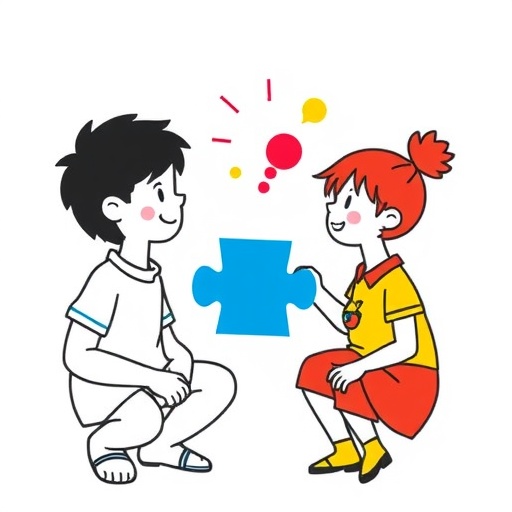Recent research has brought forth noteworthy insights into the intricate interplay between Theory of Mind, social skills, and friendship quality, especially within the contexts of adolescents and adults with and without Autism Spectrum Disorder (ASD). This exploration is grounded in a robust statistical approach known as Structural Equation Modeling (SEM), which allows researchers to uncover relationships that may be too complex for simpler analyses to detect. The study’s findings hold implications not only for academic understanding but also for enhancing social interventions and support systems.
At the core of the research is the concept of Theory of Mind (ToM), which refers to the ability to attribute mental states—beliefs, intents, desires, emotions—to oneself and others. This cognitive function is crucial for effective social interaction, as it enables individuals to navigate the often unspoken rules of communication and social engagement. Interestingly, individuals with ASD can experience challenges with ToM, which may affect their social skills and the quality of friendships they form.
The study meticulously analyzed how ToM influences interpersonal relationships, shedding light on whether enhancing this cognitive skill could result in improved social outcomes for individuals on the autism spectrum. Through the lens of SEM, researchers were able to quantify these relationships, providing a clearer picture of how these three variables interact with one another in a population that experiences unique social dynamics.
Social skills, the second component examined in the study, encompass a broad range of behaviors that facilitate interaction with others. These skills include verbal communication, non-verbal cues, and the ability to read social situations effectively. The research identified a significant correlation between strong ToM abilities and higher levels of social skills among participants. This suggests that fostering ToM could enhance social competence, particularly for individuals with ASD who often struggle in unfamiliar social contexts.
The quality of friendships was also assessed, measuring not only the quantity of friendships but their depth and satisfaction levels. The analysis revealed that adolescents and adults with better-developed ToM skills reported higher quality friendships. These findings underscore the importance of emotional intelligence and social awareness in cultivating meaningful interpersonal connections, a vital aspect of mental health and well-being.
Moreover, the research contrasted the experiences of individuals with ASD against their neurotypical peers. This comparison allowed for an analysis of shared experiences and distinct challenges, providing a comprehensive understanding of friendship dynamics across different populations. It highlighted that while individuals with ASD may face unique social hindrances, the fundamental need for quality friendships and social interaction is universal.
In light of these revelations, the study advocates for targeted interventions aiming to improve ToM as a means to enhance social skills and the overall quality of relationships for individuals on the autism spectrum. Educational programs that incorporate ToM training could be instrumental in aiding these individuals to better understand social cues and navigate friendships with greater ease, leading to a more inclusive society.
Furthermore, the research calls for continued investigation into the nuances of social interactions within varied contexts of ASD. Understanding how different environments—such as educational settings, workplaces, and community gatherings—affect social engagements could further inform better support structures for individuals with autism. This latter avenue of research could uncover unique, context-specific strategies that could be deployed to foster social integration.
The implications of these findings are vast, resonating not just within academic circles but reaching into policy making and community programming. There is a growing recognition of the need for informed strategies that can assist in bridging the social gap for those with ASD. As society continues to evolve and strive for greater inclusion, these insights can underpin meaningful changes that will benefit individuals across the spectrum.
By harnessing the findings of this research, practitioners and educators can collaboratively develop comprehensive strategies that not only teach social skills but also emphasize the importance of friendship quality and emotional understanding. This is particularly critical as individuals with ASD transition into adulthood, where social networks often determine professional and personal success.
Ultimately, this study contributes to a burgeoning body of knowledge that seeks to demystify the social lives of individuals with autism. By meticulously examining the relationships between ToM, social skills, and friendship quality, researchers are paving the way for better educational and therapeutic approaches that promise to enhance the lives of many.
In conclusion, as discussions around autism continue to gain prominence, it becomes increasingly essential to cultivate an environment that promotes understanding and empathy. Research such as this acts as a catalyst, steering society toward a more inclusive future where individuals with autism can thrive socially and emotionally.
By addressing these interconnected areas—in this case, Theory of Mind, social skills, and friendship quality—researchers are not only aiding academic discourse but also laying the groundwork for transformative social practices that could change lives for the better.
As we move forward, the potential for harnessing cognitive skills to foster better interpersonal communication should encourage further interdisciplinary dialogue among psychologists, educators, and policy makers. Together, they can ensure that the needs of individuals with ASD are met, paving the way for a future full of possibilities and enriched social experiences.
Subject of Research: Relationships Between Theory of Mind, Social Skills, and Friendship Quality in Adolescents and Adults With and Without Autism Spectrum Disorder.
Article Title: Exploring the Relationships Between Theory of Mind, Social Skills, and Friendship Quality in Adolescents and Adults With and Without Autism Spectrum Disorder Through Structural Equation Modeling.
Article References:
Li, J., Shum, K.Km. Exploring the Relationships Between Theory of Mind, Social Skills, and Friendship Quality in Adolescents and Adults With and Without Autism Spectrum Disorder Through Structural Equation Modeling.
J Autism Dev Disord (2025). https://doi.org/10.1007/s10803-025-07039-9
Image Credits: AI Generated
DOI:
Keywords: Theory of Mind, Autism Spectrum Disorder, Social Skills, Friendship Quality, Structural Equation Modeling.




